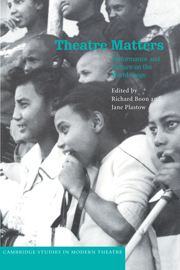Book contents
- Frontmatter
- Contents
- Notes on contributors
- Foreword: A letter from Kingston
- Preface
- Acknowledgements
- 1 Introduction
- 2 ‘The Revolution as Muse’: drama as surreptitious insurrection in a post-colonial, military state
- 3 Making theatre for a change: two plays of the Eritrean liberation struggle
- 4 Race matters in South African theatre
- 5 Dreams of violence: moving beyond colonialism in Canadian and Caribbean drama
- 6 The French-speaking Caribbean: journeying from the native land
- 7 ‘Binglishing’ the stage: a generation of Asian theatre in England
- 8 Popular theatre for the building of social awareness: the Indian experience
- 9 The promise of performance: True Love/Real Love
- 10 Making America or making revolution: the theatre of Ricardo Halac in Argentina
- Index
1 - Introduction
Published online by Cambridge University Press: 25 October 2009
- Frontmatter
- Contents
- Notes on contributors
- Foreword: A letter from Kingston
- Preface
- Acknowledgements
- 1 Introduction
- 2 ‘The Revolution as Muse’: drama as surreptitious insurrection in a post-colonial, military state
- 3 Making theatre for a change: two plays of the Eritrean liberation struggle
- 4 Race matters in South African theatre
- 5 Dreams of violence: moving beyond colonialism in Canadian and Caribbean drama
- 6 The French-speaking Caribbean: journeying from the native land
- 7 ‘Binglishing’ the stage: a generation of Asian theatre in England
- 8 Popular theatre for the building of social awareness: the Indian experience
- 9 The promise of performance: True Love/Real Love
- 10 Making America or making revolution: the theatre of Ricardo Halac in Argentina
- Index
Summary
Theatre Matters is an assertive title, but it embodies an idea that the editors and contributors to this book all, in very different ways, see as central to our engagement with the theatrical form. If I were writing this in parts of the South I might not feel the need to make the assertion so emphatically because it would be more self-evident. In countries such as Nigeria and South Africa, and in some parts of India, theatre productions, companies and playwrights have engaged, often head-on, with the ruling classes in debates about government and social and political reform. The impact of such interventions can be seen most clearly in the level of state response. Banning orders, censorship, imprisonment and, in the most extreme cases, murder, as in the 1996 state killing of the Nigerian writer Ken Saro Wiwa, have often been the lot of those who have used theatre to take on the state, and it should be noted that several of those featured in this book have lived with the knowledge that their work may at any moment cost them their freedom, or possibly their lives. If theatre did not matter, as in such immediate ways it palpably does not matter in most of the western world, state responses would not be so extreme.
In other instances the theatres we are debating here are not dealing with political embattlement but, as in the Caribbean pieces, the essay by Jatinder Verma and the plays of the native American playwright Tomson Highway, as discussed by. Christopher Innes, with the creation of identities and a sense of self-worth.
- Type
- Chapter
- Information
- Theatre MattersPerformance and Culture on the World Stage, pp. 1 - 10Publisher: Cambridge University PressPrint publication year: 1998

